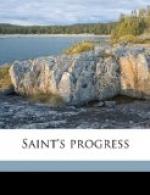George Laird was thirty. At the opening of the war he was in an East-End practice, and had volunteered at once for service with the Army. For the first nine months he had been right up in the thick of it. A poisoned arm; rather than the authorities, had sent him home. During that leave he married Gratian. He had known the Piersons some time; and, made conscious of the instability of life, had resolved to marry her at the first chance he got. For his father-in-law he had respect and liking, ever mixed with what was not quite contempt and not quite pity. The blend of authority with humility, cleric with dreamer, monk with artist, mystic with man of action, in Pierson, excited in him an interested, but often irritated, wonder. He saw things so differently himself, and had little of the humorous curiosity which enjoys what is strange simply because it is strange. They could never talk together without soon reaching a point when he wanted to say: “If we’re not to trust our reason and our senses for what they’re worth, sir—will you kindly tell me what we are to trust? How can we exert them to the utmost in some matters, and in others suddenly turn our backs on them?” Once, in one of their discussions, which often bordered on acrimony, he had expounded himself at length.
“I grant,” he had said, “that there’s a great ultimate Mystery, that we shall never know anything for certain about the origin of life and the principle of the Universe; but why should we suddenly shut up our enquiring apparatus and deny all the evidence of our reason—say, about the story of Christ, or the question of a future life, or our moral code? If you want me to enter a temple of little mysteries, leaving my reason and senses behind—as a Mohammedan leaves his shoes—it won’t do to say to me simply: ‘There it is! Enter!’ You must show me the door; and you can’t! And I’ll tell you why, sir. Because in your brain there’s a little twist which is not in mine, or the lack of a little twist which is in mine. Nothing more than that divides us into the two main species of mankind, one of whom worships, and one of whom doesn’t. Oh, yes! I know; you won’t admit that, because it makes your religions natural instead of what you call supernatural. But I assure you there’s nothing more to it. Your eyes look up or they look down—they never look straight before them. Well, mine do just the opposite.”
That day Pierson had been feeling very tired, and though to meet this attack was vital, he had been unable to meet it. His brain had stammered. He had turned a little away, leaning his cheek on his hand, as if to cover that momentary break in his defences. Some days later he had said:
“I am able now to answer your questions, George. I think I can make you understand.”
Laird had answered: “All right, sir; go ahead.”
“You begin by assuming that the human reason is the final test of all things. What right have you to assume that? Suppose you were an ant. You would take your ant’s reason as the final test, wouldn’t you? Would that be the truth?” And a smile had fixed itself on his lips above his little grave beard.




